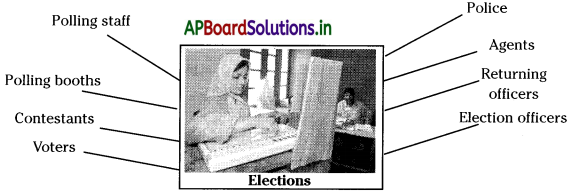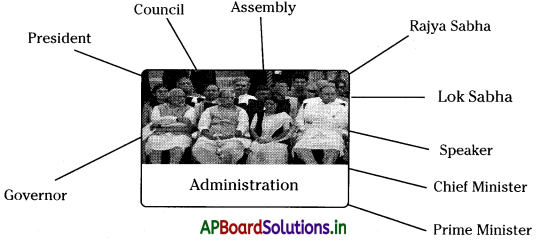Students can go through AP State Board 8th Class Social Studies Notes Chapter 14 Parliament and Central Government to understand and remember the concept easily.
AP State Board Syllabus 8th Class Social Studies Notes Chapter 14 Parliament and Central Government
→ The Constitution provides a parliamentary form of government.
→ Lok Sabha TV telecasts daily the discussions taking place in the Parliament.
→ In 1986, the Parliament adopted a National Policy on Education.
→ There are two houses of Parliament – Lok Sabha and Rajya Sabha.
→ Any ordinary law needs to be passed by both houses. Lok Sabha exercises more powers in money matters.
→ Normally, elections to the Lok Sabha are held every five years.
→ The first general elections were held in 1951-52.
→ An Election Commission was set up to conduct the elections in a free and fair manner.
![]()
→ In an ideal situation, every voter is expected to know about the different candidates, their policies and decide whose policies they would prefer and who they think can represent their interests best in the Parliament and then vote.
→ The Election Commission in recent times has taken very strict measures to control illegal practices.
→ The MLAs of all the states and the members of both houses of the Parliament elect the President.
→ The Prime Minister and the Council of Ministers are chosen from among the members of Parliament.
→ All decisions of the government of India are taken in the name of the President.
→ Legislature: The house which is constituted by the elected members of the state in our election. (By the voters)
→ Lok Sabha: The house which is constituted by the elected members of the nation. This is also known as Lower House.
→ Rajya Sabha: Some wise people are elected to this and some are nominated. This is also known as Upper House.
→ Election Commission: An independent statutory body in India
→ Council of Ministers: The Prime Minister appoints some members of Parliament to this council. This is known as the Council of Ministers.
![]()
→ Central list: Subjects on which laws can be made only by the Parliament.
→ State list: Subjects on which laws can be made only by State Legislature Assemblies.
→ Concurrent List: Subjects on which laws can be made by both Parliament and State Legislature Assemblies.

